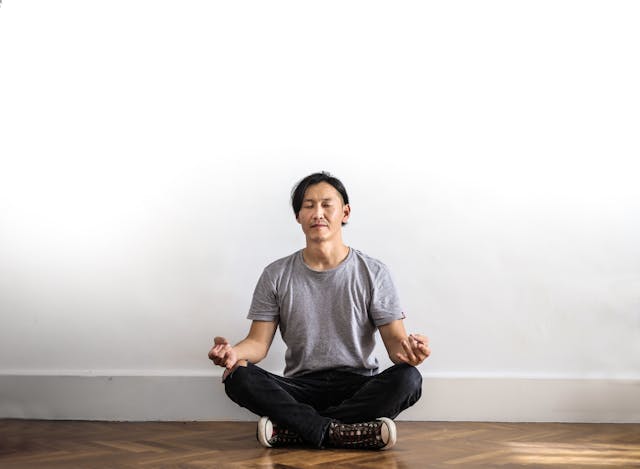Meditation is a powerful tool that has been used for centuries to cultivate inner peace, clarity, and mindfulness. But what exactly is meditation, and what is its purpose? In this article, we will explore the history and different practices of meditation, and examine the various benefits it can offer.
Meditation is a practice that involves training the mind to focus and be present in the moment. It has its roots in ancient Eastern spiritual traditions, such as Buddhism and Hinduism, and has since been adopted by many cultures around the world. Meditation can be practiced in many different ways, including through mindfulness, loving-kindness, and transcendental meditation.
Despite its long history, meditation has only recently gained widespread popularity in the Western world. This is due in part to the growing interest in mindfulness and wellness, as well as the increasing awareness of the benefits of meditation.
So, what is the purposes of meditation? The answer to this question depends on the individual and their specific goals and needs. Some people may use meditation to reduce stress and anxiety, while others may use it to cultivate a sense of inner peace and clarity. Some may use meditation to improve their focus and concentration, while others may use it to connect with a higher power or to find meaning and purpose in their lives.
Regardless of the specific purpose, meditation can offer a wide range of benefits, including reduced stress and anxiety, improved sleep, increased focus and concentration, and a greater sense of inner peace and clarity. It can also help to improve emotional regulation, increase self-awareness, and promote a greater sense of compassion and understanding.
In the following sections, we will explore the different practices of meditation, the various benefits it can offer, and the ways in which it can be incorporated into daily life.
Understanding Purposes of Meditation
Whether you are a seasoned meditator or just starting out, this article will provide you with a comprehensive understanding of the purpose and benefits of meditation, and offer practical tips for incorporating it into your daily routine.
I. Psychological and Mental Health Benefits

Mindfulness meditation has been found to have numerous benefits for both physical and mental health. These benefits include:
Reduced Stress and Anxiety
Meditation’s impact on stress and anxiety is profound. Eppley and Gross (2014) highlight how meditation strengthens prefrontal cortical control, essential in managing anxiety and affective disorders. This enhanced control fosters a calm, collected mind, even amidst life’s turbulences.
Improved Mood and Emotional Regulation
The journey of meditation leads to a more balanced emotional state. Keng, Smoskie, and Robins (2011) emphasize the positive effects of mindfulness-based stress reduction on emotional reactivity in anxiety disorders. This practice helps in smoothing the emotional peaks and troughs, leading to a more steady and resilient emotional landscape.
Enhanced Focus and Concentration
Meditation sharpens the mind, honing focus and concentration. Chambers and Fresco (2010) discuss how mindfulness practices can refine executive processing, enhancing the subjective experience of cognitive tasks. This heightened focus can transform everyday tasks into more engaging and efficient experiences.
Increased Self-awareness and Acceptance
The path of meditation also leads to deeper self-awareness and acceptance. Kabat-Zinn (2003) describes how mindfulness-based stress reduction teaches awareness of mind and body, aiding in managing stress and difficult emotions. This self-awareness fosters a compassionate acceptance of oneself, an invaluable asset in personal growth.
Reduced Symptoms of Depression
Meditation offers a beacon of hope for those battling depression. Teasdale et al. (2010) shed light on how cognitive theory and practices in meditation can alleviate depressive symptoms. By rewiring thought patterns, meditation can be a potent ally in the fight against depression.
Improved Sleep Quality
The benefits extend into the night, enhancing sleep quality. Black and Thayer (2010) demonstrate the link between meditation and improved heart rate variability, a factor influencing better sleep. Restful sleep is a cornerstone of overall mental health, and meditation is a key to unlocking this.
Enhanced Cognitive Function
Lastly, meditation can elevate cognitive function. Brefczynski-Lewis et al. (2011) explore the neural correlates of mindfulness, revealing its positive impact on brain function and personality. This cognitive boost is not just about being sharper; it’s about nurturing a healthier, more resilient mind.
The benefits of mindfulness meditation are numerous and well-documented. By incorporating mindfulness meditation into their daily routine, individuals can experience improved physical and mental health, increased self-awareness, and greater emotional regulation.
Read: Spiritual Exercise: Understanding Its Essence and Practices
II. Physical Health Benefits
As we learn more about meditation, it becomes clear that it has benefits for more than just the mind. The benefits to physical health are just as great, providing a complete approach to health. Here are some real benefits of meditation that have been backed up by science and show how it can be an important part of your health.
Reduced Blood Pressure
Meditation offers a natural remedy for high blood pressure, a common ailment in today’s fast-paced world.
Eppley and Gross (2013) highlight meditation’s role in regulating emotional and attentional processes, indirectly aiding blood pressure control.
Schneider and Mobley (2009) further support this by demonstrating the effectiveness of Transcendental Meditation in cardiovascular health, showing consistent reductions in blood pressure.
Improved Heart Rate Variability
The heart, too, reaps meditation’s rewards. Keng, Smoskie, and Robins (2011) reveal how mindfulness-based stress reduction can positively affect emotional reactivity and cognitive regulation, which are closely linked to heart rate variability.
This is echoed by Schneider and Mobley (2009), who found that Transcendental Meditation enhances cardiovascular health, including heart rate variability, an indicator of a healthy, resilient heart.
Reduced Inflammation
Inflammation, a root cause of many chronic diseases, can be mitigated through meditation. Chambers and Fresco (2010) discuss meditation’s effects on cognitive processes and subjective experience, which indirectly influence inflammatory responses. Epel and McEwen (2009) delve into stress’s role in disease neurobiology, highlighting how stress reduction through meditation can lower inflammation levels.
Enhanced Immune Function
Meditation strengthens the body’s defense system. Kabat-Zinn (2003) illustrates how mindfulness-based stress reduction fosters an awareness that bolsters the body’s stress and pain management. Pace et al. (2006) provide evidence of meditation’s effect on the neurogenic inflammatory response, showing an improvement in immune function.
Alleviating Chronic Pain
For those suffering from chronic pain, meditation offers a ray of hope. Keefe et al. (2010) and Kabat-Zinn (1990) both emphasize meditation’s efficacy in managing chronic pain, highlighting mindfulness-based stress reduction as a safe and effective approach.
Improved Sleep Quality
The benefits of meditation extend into the night, enhancing sleep quality. Black and Thayer (2010) illustrate the relationship between meditation, heart rate variability, and sleep. Grossman et al. (2004) specifically link mindfulness meditation to improved sleep quality, showing how a calm mind can lead to restful nights.
If you want to lower your blood pressure, boost your immune system, or just rediscover the joy of a good night’s sleep, you might want to try meditation. Mind and body are both healed through this practice, which creates a web of health that goes far beyond the meditation cushion.
III. Spiritual and Emotional Growth
The journey of meditation extends beyond the boundaries of mind and body, into the realms of spiritual and emotional development. This journey isn’t just about relaxing; it’s also about deeper self-awareness and spiritual awakening.
Meditation for Self-Awareness and Inner Peace
The cultivation of self-awareness and inner peace is central to meditation’s spiritual benefits.
This introspective practice allows people to delve into their innermost thoughts and feelings, revealing layers of their consciousness that are often unexplored in the hustle and bustle of daily life.
This journey toward self-awareness is about achieving a state of inner peace, where the mind transcends daily worries and connects with a deeper, more profound sense of self.
Meditation, in essence, acts as a mirror, reflecting our truest selves back to us. It teaches patience, acceptance, and the ability to observe without judgment. Individuals who practice regularly become more emotionally balanced, able to deal with life’s ups and downs with a grounded sense of calm.
Connection to Spiritual Practices Across Cultures
The spiritual journey of meditation is not limited to any one culture or belief system. It’s a universal quest that manifests itself in various forms across cultures and spiritual traditions.
This universality speaks to the deep human need for connection with something greater than oneself, a quest for meaning that transcends the material world.
Read: Understanding the Types of Spirituality
IV. Meditation in Daily Life

Embracing meditation is not just about setting aside time for quiet reflection; it’s about integrating its essence into the rhythm of our daily lives. This integration helps transform mundane moments into opportunities for mindfulness and growth, irrespective of how busy our schedules may seem.
Incorporating Meditation into a Busy Lifestyle
In today’s fast-paced world, carving out a space for meditation can seem daunting. However, the beauty of this practice lies in its flexibility and adaptability. Meditation doesn’t always require long hours of seclusion; even a few minutes can be profoundly beneficial.
- Mindful Moments: Start by finding small pockets of time for mindfulness. This could be a few minutes of deep breathing before starting your day, a mindful walk during your lunch break, or a brief meditation session before bed.
- Integrated Practices: Incorporate meditation into routine activities. Practice being fully present and aware while doing everyday tasks like washing dishes, showering, or eating. This helps cultivate a meditative mindset throughout the day.
- Scheduled Sessions: For those who can, setting a specific time for meditation helps in establishing a consistent practice. Early morning or late evening can be ideal times, offering quieter moments for deeper engagement.
Techniques Suitable for Beginners and Advanced Practitioners
Meditation offers a spectrum of techniques, catering to different levels of experience and comfort.
- For Beginners:
- Guided Meditations: These provide direction and structure, ideal for those starting their journey. Apps and online resources offer a variety of guided sessions.
- Breathing Exercises: Simple yet powerful, focusing on one’s breath is an excellent starting point. It’s easy to learn and can be practiced almost anywhere.
- Mindfulness Meditation: This involves observing thoughts and sensations without judgment, a foundational skill in building awareness and focus.
- For Advanced Practitioners:
- Vipassana Meditation: A deeper exploration into the nature of reality, Vipassana requires sustained attention and insight.
- Loving-Kindness Meditation (Metta): This focuses on cultivating an attitude of love and compassion towards oneself and others.
- Zen Meditation (Zazen): More rigorous in posture and discipline, Zazen is suitable for those seeking a deeper, more structured practice.
Whether you’re a beginner or an advanced practitioner, the key is consistency and patience. Over time, these practices weave themselves into the fabric of daily life, transforming ordinary experiences into extraordinary moments of clarity and peace.
Common Misconceptions about Meditation
Meditation, despite its growing popularity, is frequently shrouded in myths and misconceptions. Addressing these issues can assist in setting realistic expectations and encouraging a more informed approach to this transformative practice.
Myth 1: Meditation necessitates the emptying of the mind.
One of the most common misconceptions about meditation is that it entails emptying the mind of all thoughts. In reality, meditation is about observing thoughts without judgment rather than achieving a blank mind.
It is about learning to observe the flow of thoughts and emotions in order to gain a better understanding and control over them.
Myth 2: To be effective, you must meditate for hours.
Another common misconception is that effective meditation necessitates many hours of practice. In reality, even brief periods of meditation can be extremely beneficial.
Myth number three: Meditation is a religious practice.
While meditation is practiced in many religious and spiritual traditions, it is not religious in and of itself. It is a universal practice that cuts across cultural and religious lines.
Myth #4: Meditation is only for relaxing.
Many people believe that meditation is only used to relax. While it does help to reduce stress and promote relaxation, its benefits go far beyond that. Meditation improves self-awareness, emotional well-being, cognitive functioning, and even physical health.
Myth 5: Meditation is Difficult and Not for Everyone
Finally, there is a widespread misconception that meditation is difficult and not appropriate for everyone. Meditation, in its various forms, is available to everyone. It can be tailored to fit any lifestyle and is accessible to people of all ages and backgrounds. There is a type of meditation to suit everyone’s needs and abilities, whether through guided sessions, mindfulness exercises, or spiritual practices.
By dispelling these common myths, we can approach meditation with a more open and realistic perspective. Not only does this improve the practice, but it also makes it more accessible and enjoyable for everyone. With these clarifications in mind, let’s delve deeper into the scientific research and studies that shed light on meditation’s many benefits.
V. Scientific Research and Studies on Meditation
Meditation’s popularity has been matched by an increase in scientific research into its effects in recent decades. These studies, conducted in a variety of fields, provide an intriguing look at how meditation affects the human mind and body.
Important Meditation Research Findings
Brain Structure and Function: Meditation has been shown in studies to cause changes in brain structure and function. MRI scans show increased grey matter density in areas related to memory, empathy, and stress regulation. This suggests that meditation not only alters the experience of the mind, but also physically reshapes the brain.
Reducing Stress and Anxiety: Numerous studies support the effectiveness of meditation in reducing stress and anxiety. Mindfulness meditation has been shown to lower cortisol levels, the body’s stress hormone, resulting in less stress and anxiety.
Emotional and Mental Health: Meditation has been linked to improved emotional and mental health. According to research, regular practice can lead to increased self-esteem, improved mood regulation, and a reduction in symptoms of depression and anxiety disorders.
Physical Health Advantages: Scientific studies have looked into the impact of meditation on physical health. Blood pressure was found to be lower, heart rate variability improved, and inflammation markers were reduced. These factors contribute to a lower risk of a variety of health problems, ranging from heart disease to autoimmune conditions.
Meditation has been shown in studies to improve a variety of cognitive functions, including attention, memory, and problem-solving abilities. Long-term practitioners frequently exhibit improved cognitive flexibility and information processing.
Expert Advice on Meditation
Meditation’s benefits are increasingly being recognized by experts in neuroscience, psychology, and medicine. They emphasize its potential as a complementary therapy for a variety of mental and physical health issues.
Psychologists emphasize its role in the development of mindfulness and emotional resilience, while neuroscientists are fascinated by its ability to change brain structures and functions.
Meditation is also increasingly being recommended by medical professionals as part of holistic health regimens, particularly for stress-related conditions. However, they warn against viewing it as a panacea; while meditation is a powerful tool, it is only one component of a larger health and wellness strategy.
The scientific investigation of meditation is an ongoing journey, with new discoveries adding depth to our understanding all the time. As research advances, it becomes clear that meditation provides a plethora of benefits, influencing various aspects of human health and well-being.
As we synthesize these insights, we gain not only a better understanding of meditation’s profound effects, but also a better understanding of how it can be integrated into our lives for overall improvement. This scientific viewpoint validates the ancient wisdom that has long extolled the benefits of this practice, illuminating a path to a more balanced, healthy, and mindful exfistence.
Read: How to Start Loving Yourself Today
VI. Final Thoughts
It’s clear that this ancient practice provides much more than just relaxation. Its many goals range from improving mental and physical health to fostering deep spiritual and emotional growth.
Meditation is not a one-dimensional practice; its benefits are many. It helps to reduce stress and anxiety, improve mood, and promote emotional regulation. It has a positive impact on physical health by lowering blood pressure, improving immune function, and alleviating chronic pain.
On a deeper level, meditation facilitates increased self-awareness, inner peace, and a profound connection to one’s spiritual essence.
When considering incorporating meditation into your life, keep in mind that the goal is progress, not perfection. It’s about finding moments of peace in the midst of a hectic day, learning about your own mind and body, and connecting with a deeper part of yourself. Meditation is a journey of exploration, self-discovery, and transformation.
We encourage you to investigate this practice for yourself and witness its transformative power in your own life. Your meditation journey could be the start of a profound and fulfilling adventure in personal growth and spiritual discovery.






